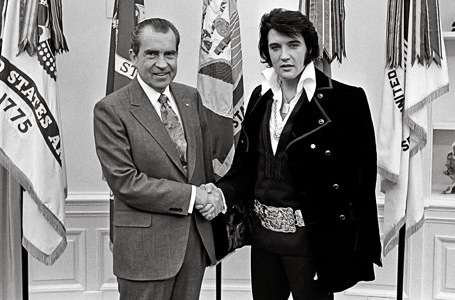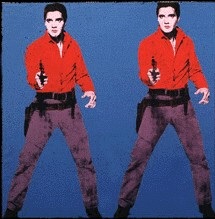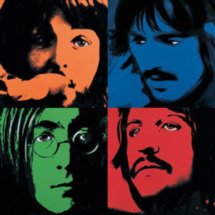Breaking down Presley and Beatlemania
EIN SPOTLIGHT by Harley Payette - (2007) |
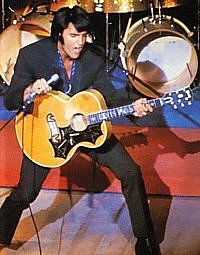
|
In a very stimulating commentary, EIN contributor Harley Payette presents his case for Presleymania and Beatlemania.
EIN recommends this very thoughtful and cogent commentary to all readers.
With themes including sexual tension, civil rights, backlash by society's cultural arbiters, r&b integration and realising the American dream.......this is a powerful exposition! |
 |
In the late 20th century there were two great popular culture upheavals with the rise of Elvis Presley and the Beatles. Occurring within ten years of one another, both marked the beginnings of new eras, not only in the world of music but in the overall fabric of world culture. There were many similarities between the two pop explosions including the daring new music produced by the artists that led the revolution and their followers.
Both certainly could not have happened in any other eras in US history. Unlike Frank Sinatra who created a sensation at the New York Paramount in 1942, Elvis and the Beatles had access to wealthier and healthier listeners with greater access to more forms of media. Also, unlike the Chairman of the Board, Elvis and the Beatles had a chance at a moment of undivided media attention. When Sinatra made his breakthrough the world was at war. Now there was a lot going on when Elvis and the Beatles’ hit, like the unraveling of the US Civil Rights movement and in the Beatles’ case the first escalation of US involvement in Viet Nam, but many of their listeners/viewers would have had their minds free, at least for a moment, to focus exclusively on them.
Unlike Michael Jackson in the 1980s, the Beatles and especially Elvis had an audience that wasn’t used to full scale media pop phenomena. And in Michael Jackson’s 1980s there were so many choices in the existing media that no one artist could ever fully grab the public’s attention as those two artists did in their eras. It was also impossible for Jackson to happen the way he did without Elvis and the Beatles coming first. The Beatles and Elvis both changed the rules on how big you could be and also who had the impact to become that big.
In retrospect, looking at the historic record, it may be kind of tough to differentiate between the two movements other than the fact they marked a generational shift. It’s tempting if you’re baby boomer to look at Elvis as a dry run for Beatlemania or if you’re an Elvis fan to see Beatlemania as merely an extension of what Elvis started.
Finding the differences though tells us a lot and hopefully gives us an appreciation for the achievement of both artists. In this article I want to note down some particular instances that I’ve discovered searching through the historic records, with the hope that some readers will put their two cents in so we can delve more into an appreciation of these two historic events.
I think an obvious difference between the two epochs was the fact that Beatlemania was more concentrated in the United States. Elvis’ initial impact kind of snuck up on the culture in 1956. When he first appeared on the Dorsey Show in January the game was not on yet. It was only after multiple appearances, weeks of touring and airplay for “Heartbreak Hotel”, that Elvis was suddenly everywhere.
The Beatles by contrast, buoyed by media coverage of the hysteria in England and heavy airplay on radio stations anticipating the first US visit and TV performance, dropped on America all at once. It even started with their arrival at the US airport, press conferences, Ed Sullivan and then everything else. While Elvis had his talk of the town moments- specifically Milton Berle, and Ed Sullivan, they occurred after he achieved stardom. For the Beatles, there was a sense, again in the US, of being there at the beginning. This all added more steam to the hysteria side of Beatlemania.
Another difference that jumps out at me are the particular niches demanded and filled by Elvis and the Beatles in the United States.
When Elvis came along, US culture was reeling from the McCarthy era where conformity was a national obsession. Breaking from the norm could get you labeled an agent of communism. To question any aspect of the American Dream was tantamount to endorsing the other side. To that end, many producers of American art and culture had worked to sanitize art and music, to drain the blood out of everything. In this country everything was PERFECT. Only thing was… everyone knew this idea was a fraud but no one could actually say it. An individualist was needed, someone Earthy, someone sexual, someone who bled for their art. Elvis stepped in to the void and acknowledged all the people who had been left out of that dream and also exposed the sanitized dream of perfection. Elvis' success showed perfection to be a bore.
 |
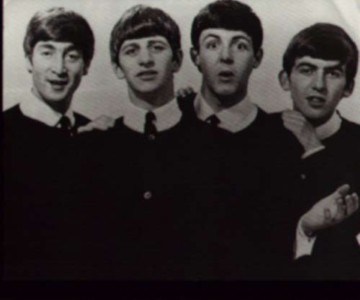 |
Some have commented that maybe the Beatles were bigger than Elvis because they were a group and could bridge more different temperaments. That may or not be true, but Elvis could not have hit as hard as he did at that time as a part of a greater group. Elvis had to be different. He had to stand alone.
When the Beatles came along eight years later, the United States needed a laugh, needed escapism. Only months after the assassination of John F. Kennedy, America’s sense of itself was lost. While in historical retrospect the first two and half years of the Kennedy administration may not have been Camelot but there was a general perspective that the country could be better, could improve itself and the world could be improved as well. Then came the shock that all that positivity could be wiped out, in a civilized modern western country, by a single gunshot - and it was truly disconcerting. People must have thought “Why bother when everything can unravel so easily?”
The Beatles came along and answered that question by saying, in effect, “Don’t worry about it. Life can also be fun.” If you think back on the Mop Tops, that’s their message. From their press conferences to their harmonies to their mostly buoyant songs, the Beatles radiated good cheer.
And for many Americans, it was necessary to get this message from abroad. It had to come from somewhere else, from someone with a different perspective on the world, just like it was important in 1956 that the message come from someone who was not living that false dream of perfection.
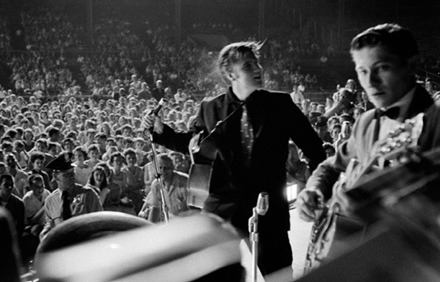 |
Perhaps the most crucial difference between Elvis mania and Beatlemania was the timing and extent of the backlash. While there were adults who scratched their heads over the Beatles and your "tough guy" Four Seasons/old time rock fans who thought the Beatles were fey, there wasn’t really a significant backlash against the Beatles until 1965-1967 when the Beatles started to say and do controversial things. When they moved away from the “Don’t worry about it" lovable Mop Tops publicity image.
With Elvis the backlash was immediate and intense. The guardians of the old order didn’t scratch their heads over Elvis, they hated him. They insulted him. His association with a product, person or a place was a reason for a boycott. There were a variety of reasons for this from prejudice of Elvis’ southern-ness, racism over his adoption of black mannerisms, and real fear of his sexuality.
The Daily News writing that “Pop music has reached its lowest depths in the ‘grunt and groin’ antics of one Elvis Presley... suggestive and vulgar, tinged with the kind of animalism that should be confined to dives and bordellos.”
Whatever the reasons, the backlash and lack thereof, altered the revolutions that Elvis and the Beatles led.
The lack of a immediate backlash against the Beatles let more people in. People who had scoffed at the Presley revolution but maybe envied the participants part in it, were now able to join in or at least try to join in. After all, rock and roll was here to stay now. The fight was over. This was what led to stuff like the Beatles meeting with Kings and Queens and enjoying invitations from the likes of Leonard Bernstein and the Rat Pack (something Elvis had to wait for until 1960). In a way this made the gross impact of Beatlemania at least superficially bigger. It also made everyone realize the potential impact of popular culture. You really could reach everyone. You can see this idea in stuff as odd as the “Batman” TV series which attempted to conquer the pop market by being both hip and square at the same time.
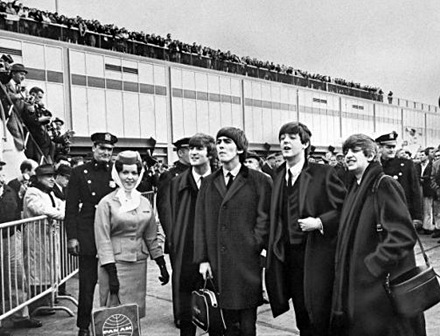 |
Even more, the large scale acceptance of the Beatles by the middlebrows made pop culture acceptable. If everyone liked it, it must have something.
By contrast, the backlash against Elvis, while it kept him from obtaining cultural credibility for a very long time, was an absolute necessity for the revolution that Elvis started, particularly the youth culture. The dissent on Elvis and rock and roll gave youth culture an identity.
What made Elvis and rock and roll belong to youth culture was the fact that adults didn’t like them. It was imperative that he belong to youth and only the youth at that moment. This was a feat that was not accomplished even by movie stars like James Dean and Marlon Brando who were admired by youth but were also co-opted by cultural arbiters, mitigating their power somewhat. That this alternate culture was born helped make the 1960's inroads made by Dylan and the Beatles and the youth protest movement possible.
Musically it was the same thing. It was important that concepts that placed rhythm over melody and separated great singing from great voices came into play. When future generation would define their difference from their elders, they would largely do so by listening to even more unconventional singers like Dylan and less melodic bands like Led Zeppelin. Elvis and the early rocker’s music HAD to sound like noise to some members of the audience to help prepare them for even greater breaks and greater freedom in the future.
Of course much of the backlash against Elvis was based upon his sexuality and the sexuality overtly demonstrated by his largely female audience towards him. America’s attitude towards sex was to basically deny its existence. Elvis’ success made it clear that sex does exist and EVERYONE thinks about these things. What’s more, sex did not have to be placed in the closet. It was normal, healthy and fun. “Playboy” and Marilyn Monroe also played their parts here along with Elvis and the early rockers but, arguably the rockers had the greater effect by demonstrating the commonality of sex and the fact that letting your sexuality surface did not lead to the end of Western civilization.
In contrast to Elvis, the early Beatles were almost sexless in their public persona. This was an important factor in the lack of an early backlash - but it was also an important factor in the changes they wrought in the industry. While I’m sure there were younger Elvis fans, the Beatles were the first rock act to tap into the lucrative pre-pubescent pre-teen market. Little kids liked the Beatles. You can tell this from the fact that producers thought a Saturday morning Beatles cartoon would be a money making venture.
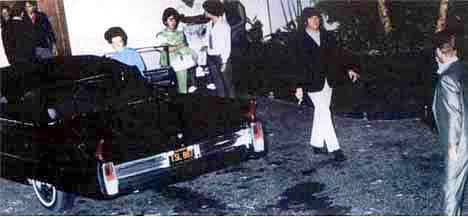 |
John Lennon at Elvis' home in Bel Air, 27 August 1965
I’ve seen it personally in my interaction with many first generation Beatles fans. Many times I’ve talked with them and been amazed they didn’t remember the original versions of songs like “Twist and Shout”, “Baby it’s You”, “You’ve Really Got a Hold on Me” or later British Invasion favorites like “Do You Love Me” (pre “Dirty Dancing”) or “I Like it Like That” despite the fact that these songs were major POP hits just a few years before they were remade by the Beatles and other Brit invasion bands. The reason these folks didn’t remember these songs was because they had hooked into the Beatles and rock and roll at a very young age. Their first musical memories are the Beatles.
While the Beatles succeeded in crossing generational lines in a way that Elvis never did, Elvis crossed racial and regional barriers in a way the Beatles never did. There is no Beatle record that topped all three major Billboard charts as many of Elvis' original records did.
In a sad contrast, while Elvis integrated the pop audience, the Beatles inadvertently re-segregated it.
Perhaps because the Beatles’ music was too far removed from the original blues/gospel/American culture and because the British "Music Hall traditions" that the Beatles brought to their interpretations of American Music did not appeal to African American audiences, the Beatles never really gained a black following. While many African American performers/writers and producers recognized and were invigorated by the quality of the Beatles’ work, the Beatles were never a mass black taste. No Beatles song topped the R/B charts until Earth, Wind and Fire with “Got To Get You Into My Life” in 1978 and no Beatle made the R/B Top 40 until Paul McCartney did a duet with Stevie Wonder in 1982. This was despite the fact that the Beatles were steeped in American R'n'B. (The same thing happened in the portion of rural America represented by the country charts.)
This was a very important development in that it meant that black-rock-oriented music and white-oriented music developed along separate paths for the first time since rock'n'roll was born in the mid-1950s. In 1961, for instance, there was very little difference in the rock approach of white and black performers. Look at the white rock titans of the Pre-Beatles era the Four Seasons and you can see the similarities. The two paths crossed so frequently that Billboard actually eliminated its R/B chart in late 1963, deeming it redundant.
After the Beatles, white rock'n'roll followed the Beatles, while the black artists followed the example set by Sam Cooke, Ray Charles and vocal groups like the Temptations. This however does not mean that white record buyers stopped buying black music. In fact with the ever-growing pop music audience, the revolution that started with Elvis was more open to black sounds than it had ever been before.
However, this was a different audience than what became the hipper self-identified “rock” audience. This audience with few exceptions was not particularly interested in the popular black music of the day. These were the folks that wound up writing the history that at the time placed black performers outside the music sales that they helped to create. It also limited black performer’s success in the now lucrative album market. The folks who bought and wrote about albums just didn’t place the same premium on Smokey Robinson as they did on the Beatles.
Elvis’ success on the other hand arrived in a mainstream market that was only just beginning to accept black and rural sounds. His records increased acceptance and visibility for this style of music and performer. Eventually, the barriers would break down at the point that they did in Pre-Beatles America.
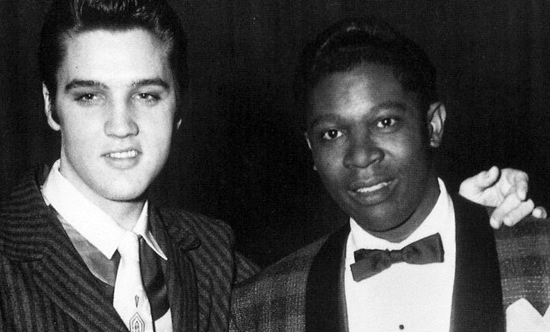 |
Of course there was a lot more going on than just Elvis and the Beatles. Both parties may have been playing their part in the ongoing struggle that was occurring in popular culture at the time that they came to prominence. Elvis came in at a point when the Civil Rights movement was just beginning. People were just starting to realize the inequities in the system. They were open to new ideas. Beatlemania was also roughly analogous to the culmination of the Civil Rights Movement in 1964. White America may have felt fatigued, that it had given enough. Black America may have also begun to question how much of its identity it wanted to subsume into the greater whole and may have been frustrated at not making further progress.
That Elvis and the Beatles both pulled so heavily from the R'n'B, country and rockabilly etc music of their eras emphasizes one last similarity between their movements. For all their revolutionary impact, one of the very best things that both Elvis and the Beatles did was to make people realize, and discover, all the good musical influences that was hidden under the surface while they were all looking the other way.
Elvis did it by bringing blues and country to the masses and emphasizing their similarities and the fact that their mixture was so thrilling. The Beatles reminded everyone that rock and roll’s well was deeper and more resilient than anyone realized. They did this not only with rockabilly b-sides from Carl Perkins and Buck Owens’ modern rockabilly but also all the terrific rock and roll from the early ‘60s Shirelles, Isley Brothers, Motown etc. I’ve always said the best argument for early pre-Beatles ‘60s rock and roll is the Beatles themselves. They would have been a lot different without it.
I do agree that the Beatles helped rock and roll be considered an "art form" by the mainstream press but they had been preceded in the media addressing the music as a self-conscious "art form" by Phil Spector among others.
One change that Beatle fans definitely made was in consuming Beatle albums as widely as Beatle singles. In the 1950s rock artists were consumed by the 45 vinyl single. Elvis was an exception in that he also sold a lot of albums. However, his LP numbers were only a fraction of what his singles and EPs moved. The buying habits of Beatle fans made album purchases at least as significant commercially as 45s. This is not to say that the overally LP market, especially the market for rock, wasn't growing in the early 1960s. You can see that in sales numbers and chart positions for artists of that era compared to even just a few years before.
The Beatles were also the primary movers in the LP as a self-contained art form movement in rock. While the group was not even close to being the first artists to approach LPs in this way, being preceded by pop performers like Sinatra and also many rock performers like Bo Diddley, when the Beatles started releasing "albums" in an alternate way to their "singles" it then became an industry trend. So while they did not invent the approach, when other rockers followed, along with the mainstream, they were imitating the Beatles.
The Beatles also changed the axis of rock and roll from the individual artist and the vocal group, to the self contained group. That was a big change.
Influenced by Bob Dylan, the Beatles' John Lennon also made incorporating your personal confessions into your music both trendy and culturally accepted.
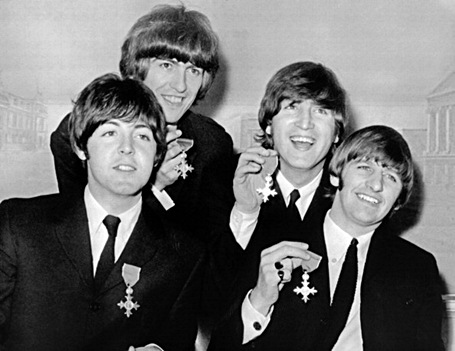 |
Perhaps the most profound musical influence came from the Beatles' audience and even their acceptance by the British nobility and politicians. This was the idea that in order to be artistically credible an artist had to be self-contained - IE write produce, play and sing your music. This however was, in my opinion, a bad change. Some popular artists have no business in writing songs, as well as singing and producing themselves and some of these composers obviously need an outsider's viewpoint to tell them when they are being truly experimental or if they are only indulging themselves.
Looking at Elvis' popularity, he was certainly a worldwide phenomenon especially in Europe. The demand for Elvis' product was also extraordinary in much of the Far East, particularly Japan. The original "Aloha" airing in 1973 was directed at that part of the world.
My earlier comparison was meant to simply comment on the original hysteria periods experienced by Elvis and the Beatles. It is a mistake however to compare the Beatles' career directly one to one with Elvis. If Elvis' career had stopped after only eight years in 1962, it would have looked - like the Beatles - close to flawless as well.
You can't go crazy on artistic intent by the way. I'm sure a hack like Jon Bon Jovi also thinks he's changing the world with every release he puts out there. Similarly a performer like Ricky Nelson was believed by many to surpass many of his rivals in artistic intent. Yet even at his best, Nelson was not in anyway on the same creative artistic plain as Elvis, with Elvis' ability to record multiple musical genres being so superior.
Of course my comment about Jon Bon Jovi is figurative. My real point is that, like many rock idols, he probably his approaches everything he does as a work of great importance and virtually none of it is. I think intent should be respected but in the end of the day the final product is what matters. So many great rock, pop and soul tracks have been recorded under duress - think "Walk on By", "Where Did Our Love Go" etc. Great artists like Chuck Berry are also famous for payment first, music later. And some of the most ambitious music is also some of the most spectacularly bad music.
The Beatles probably never returned to live performing for the same reason Elvis never returned to movies or never toured the world. When they quit they probably expected to be around a lot longer as a studio-based group than they eventually were.
From the available audio and visual evidence, the Beatles were a more-than respectable live group although I think it would be overstatement to rank them with Elvis, the Who, James Brown, Springsteen etc, in that regard. This is not as insult but I think it's a mistake to dismiss the Beatles as performers.
Elvis made incredible live comebacks not only in 1968 / 1969 but also briefly after his return from the army in 1960 ans always with some truly stunning performances. Sadly the Beatles last concert would be in San Francisco on 29 August 1966 which was only two and half years after their very first live US performance.
Pop music uses performance to drive sales. The hysteria the Beatles created was as performers and as producers. They weren't always the most technically adroit singers but neither were James Brown or Carl Perkins. They didn't have the greatest vocal stylistic (although they weren't one trick stylistic vocal ponies) range in the world but neither did a great act like the Four Tops. The thing was that they were able to sing their music and some of the music of other performers (some stuff like their Motown remakes are lame) with their brand of unique enthusiasm. That's all that matters.
These are my musings from looking at the historic and sonic records. I’d love to hear the memories of folks that were there or other impressions.
(Let’s leave "the Beatles are overrated" stuff at home.)
John Lennon And Elvis: It was "Thirty Years Ago Today" - On December 8th 1980 John Lennon was shot dead outside his New York apartment. In commemoration, LA Times music critic Robert Hilburn remembers discussions with John Lennon about life and Elvis...
>> In mid 1980 John Lennon raced into Yoko Ono's home office in the mammoth old Dakota building with a copy of Donna Summer's new single, "The Wanderer." "Listen!" Lennon shouted as he put the 45rpm on the record player. "She's doing Elvis!" I didn't know what he was talking about at first. The arrangement felt more like rock than the singer's usual electro-disco approach, but the opening vocal sure sounded like Donna Summer to me. Midway through the song, however, her voice shifted into the playful, hiccuping style Elvis had used on so many of his early recordings.
"See! See!" John shouted, pointing at the speakers "That's Elvis!"
Lennon plugged in one of his prized possessions a vintage jukebox. He then punched one Elvis Presley record after another and bopped around playfully. |
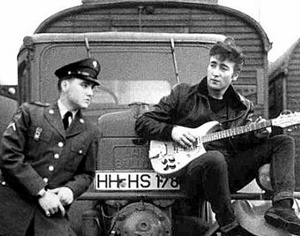 |
Lennon ended up spending so much time talking about Elvis and other favorites from the 1950s that I was afraid we weren't going to get to the Beatles and his solo career.
As Elvis sang "Don't Be Cruel" in the background, John recalled his first and only meeting with our mutual rock hero. It was a story he relished sharing as much as he did his Beatles memories.
"It was probably 1965 and we had a break in L.A. during a tour. We went up to his house and we were terrified. I can't remember the first moment I saw him, but Elvis looked great. We started singing some of his songs. That's what we always did when we met Chuck Berry or Carl Perkins or any of them."
I asked if Elvis had known how big the Beatles were and if he had felt any hint of competition.
"Are you kidding?" John replied with a laugh. "Elvis knew damn well who we were -- from the word 'go.' He was terrified of us and the English movement because we were a possible threat to him. To us, Elvis was a god. We'd like to beat his record and become the champion, but we would always give Elvis credit. It always hurts and infuriates me when Mick Jagger puts Elvis down. Maybe he's jealous because Elvis was the original body man in rock and it's too near to Mick's game for him to admit that Elvis' movements were at least as good as his and that maybe Elvis could sing a damn sight better than he could."
We had such a good time over the three days that Lennon invited me to his and Sean's birthday party. I knew what the perfect birthday present for John was. I had mentioned in the studio that there was a great new Elvis photo book by Alfred Wertheimer, who had spent a couple of weeks with Elvis around the time of "Hound Dog" in 1956. John hadn't seen it.
I didn't want to bother John, so I left the book with the doorman.
Two months later Lennon was dead."
Go here for more on John Lennon, Elvis and The Beatles
(News, Source;ElvisInfoNetwork - October 2010) |
Read EIN's set of articles on "Elvis' record sales" and "Elvis vs. The Beatles":
John Lennon And Elvis - 2010 - On December 8th 1980 John Lennon was shot dead outside his New York apartment. Robert Hilburn remembers discussions with John Lennon about life and Elvis...
'Elvis Meets The Beatles' 2010
Larry Geller talks about Elvis and The Beatles meet-up in 1965
Elvis artefact on display in Liverpool Beatles Exhibition 2010:
Breaking down Presley and Beatlemania (2007)
Why can't Elvis compete...against the Beatles and Garth Brooks? (2007)
Ernst & Roger's persuasive argument for Elvis
Controversial university study incenses Elvis fans (published 2006)
Elvis vs. The Beatles - The Matrix Argument (2006)
Paul McCartney talks about Heartbreak Hotel (2005)
Was there anything before Elvis? (2005)
Elvis vs. The Beatles - Nigel eats humble pie (2004)
Elvis vs The Beatles (Part 1) (2004)
World Title Fight - Elvis vs. The Beatles (2002)
Elvis or Beatles?
Elvis Lacks Credibility
|
|












